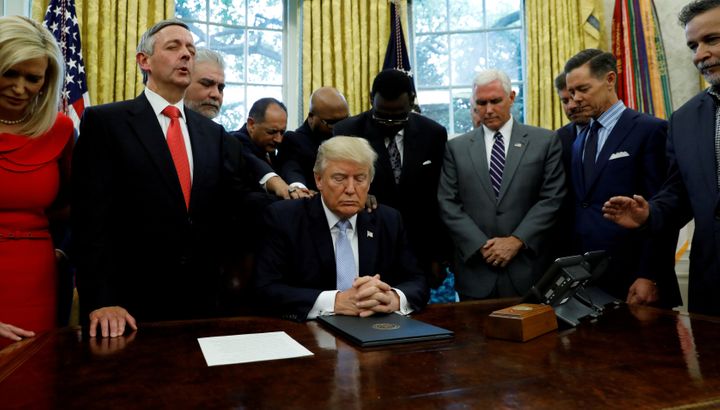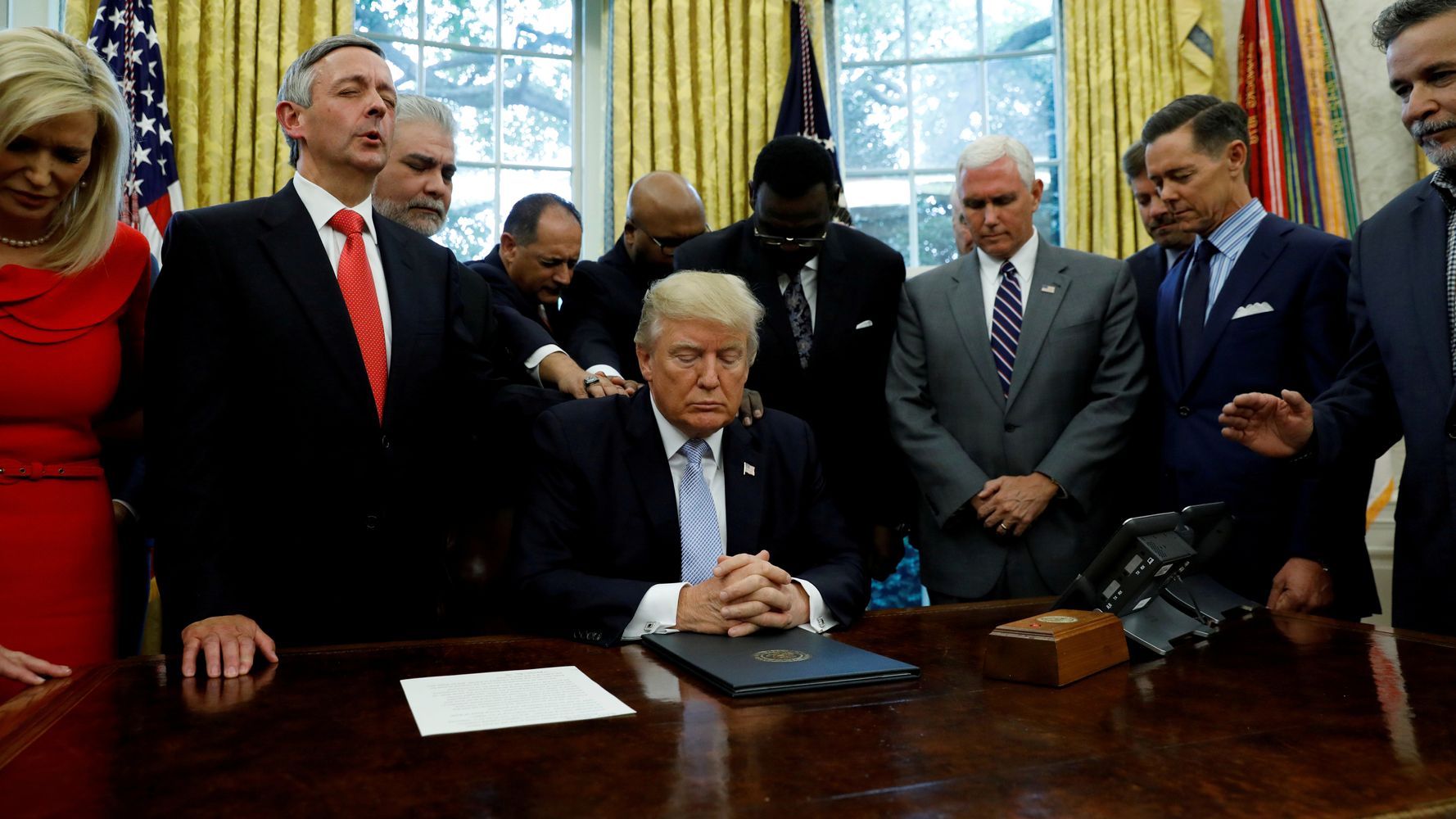[ad_1]
As House Democrats investigate President Donald Trump’s dealings with Ukraine, white evangelicals are standing firmly behind their man.
A new survey from the Public Religion Research Institute illustrates how loyal this powerful religious demographic is to Trump ― and how deeply alienated it is from other major American religious groups, particularly Christians of color and the religiously unaffiliated.
Eighty-eight percent of white evangelical Protestants said they don’t think Trump should be impeached and removed from office — significantly more than any other major religious group surveyed in PRRI’s 2019 American Values Survey. The majority of other white mainline Protestants and white Catholics shared the same view, but not as strongly.
On the other hand, Christians of color were more likely to say that Trump should be impeached and removed from office, including 72% of Black Protestants, 70% of Hispanic Catholics, and 53% of Hispanic Protestants. The religiously unaffiliated ― folks who say they are atheist, agnostic or “nothing in particular” ― were also likely to support impeachment (63%).
PRRI’s survey asked respondents for their views on Trump’s potential impeachment and a number of other political and social issues. The responses from 2,527 adults, polled online and by phone between Aug. 22 and Sept. 15, were published Monday. A supplemental survey of 1,032 adults took place between Oct. 10 and 13.

On Sept. 9, as the survey took place, House committees launched an investigation into whether Trump abused the U.S. foreign policy apparatus for political gain. The Democrat-led inquiry is looking into allegations that the president sought political favors from Ukraine to help his 2020 reelection campaign.
Trump has called the congressional investigation a “witch hunt” while some of his close evangelical allies have issued dire warnings about the inquiry. Texas pastor Robert Jeffress suggested that the U.S. will face a “Civil War-like fracture” if Trump is ultimately removed from office, while evangelist Franklin Graham predicted that “our country could begin to unravel.”
White evangelicals have long been a dependable base for Trump and the GOP. PRRI’s survey found that support for Trump among this religious group remained unchanged even after the announcement of impeachment proceedings.
In October, about 76% of white evangelicals said they approved of the job Trump was doing in office, something only 43% of all Americans agreed with. Among white evangelicals who approve of Trump’s performance, about 30% said there was virtually nothing Trump could do to lose their support.
White evangelicals stand apart from other groups in how they think about the president’s behavior. In mid-September, most didn’t think Trump had damaged the dignity of the office (63%) ― although majorities of all other major religious groups said the opposite. White evangelicals were the respondents most likely to say that Trump’s personal conduct did not make a difference to them (47%).

The gap between white evangelicals and other groups was also apparent in questions PRRI asked about immigration and race.
White evangelicals were more likely than other religious groups to believe that immigrants have a negative impact on their local communities, with 71% saying immigrants create a burden by using social services and 62% saying that immigrants increase crime. They were the group that expressed the most support for the separation of children from their families at the border (39%).
White evangelicals don’t believe Trump’s behavior has had an effect on white supremacist groups (70%). On the other hand, most Black Protestants (78%), Hispanic Protestants (66%), and religiously unaffiliated Americans (74%) believe Trump’s behavior has encouraged white supremacist groups.
About 65% percent of white evangelicals completely or mostly agreed that discrimination against white Americans has become as big a problem as discrimination against Black Americans and other minorities. Majorities of white mainline Protestants (51%) and white Catholics (59%) said the same.
But Christians of color did not share this view. Most Black Protestants (74%), Hispanic Protestants (62%) and Hispanic Catholics (72%) completely or mostly disagreed that discrimination against whites is as big a problem as discrimination against Blacks and other minorities.
These statistics could become a challenge for white evangelicals as the country becomes more diverse and the number of religiously unaffiliated Americans continues to grow, especially among millennials.
By doubling down on the issues important to his shrinking base, Trump risks turning off more of the electorate, according to Washington Post opinion writer Jennifer Rubin. And in the long run, this could cause problems for the GOP, she said.
“[White evangelicals’] burning resentment toward ‘elites’ masks a more fundamental alienation from a majority of all Americans,” Rubin wrote. “Republicans are playing a losing hand as the electorate as a whole becomes more diverse and identifies with progressives on policy and cultural issues.”
REAL LIFE. REAL NEWS. REAL VOICES.
Help us tell more of the stories that matter from voices that too often remain unheard.
[ad_2]
Source link

